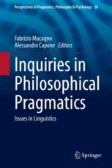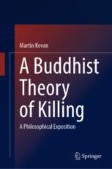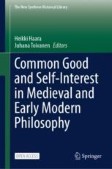Search
Search Results
-
The Essence of Language in View of Death
In his later work Heidegger provides several, seemingly disparate determinations of the essence of language. In the Letter on Humanism, henceforth...
-
Perceptual transparency and the temporal structure of experience
According to the Matching Thesis (MT), the temporal structure of experience in time matches the apparent temporal structure of the objects and events...
-
Being of Motion (Bergson)
Bergson is one of Zeno’s most trenchant critics. Epistemological critiques of the Eleatic thesis of immobile being can be found at many points in his...
-
Philosophy and cognitive science on spatial and temporal experience
The study of the contrast between fundamental aspects of spatial and temporal awareness offers a good opportunity to bring to light the relation...
-
Don’t Go Chasing Waterfalls: Motion Aftereffects and the Dynamic Snapshot Theory of Temporal Experience
The philosophical investigation of perceptual illusions can generate fruitful insights in the study of subjective time consciousness. However, the...
-
What could come before time? Intertwining affectivity and temporality at the basis of intentionality
The enactive approach to cognition and the phenomenological tradition have in common a wide conception of ‘intentionality’. Within these frameworks,...

-
Perfecting agents
The focus of this paper is the process of perfecting agents. There are two views that attempt to explain what perfecting an agent looks like,...
-
The Incompatibility of Perdurantism and Priority Monism
In this paper, I argue that perdurantism is incompatible with priority monism: the view that the universal mereological fusion, U, is fundamental....
-
Modernity and the Temporal Shift: Overcoming the Problem of Self-Deception
This chapter clarifies and reframes the First Paradox. As seen in previous chapters, the First Paradox is the simultaneous criticism and deployment...
-
We Hold Ourselves Accountable: A Relational View of Team Accountability
Accountability is of universal interest to the business ethics community, but the emphasis to date has been primarily at the level of the industry,...
-
Consequences of the Idealist Interpretation for the Unity of Space
In this chapter, I discuss the first implication of the Idealist reading, pertaining to the (dis)unity of space. I consider both the spatial...
-
Pragmatics and Grammar as Sources of Temporal Ordering in Discourse: The Case of And
The source of the temporal reading of sentential and coordination is still a matter of dispute. In this paper we briefly introduce the seminal...
-
Argumentation and the Challenge of Time: Perelman, Temporality, and the Future of Argument
Central to Perelman and Olbrechts-Tyteca’s philosophical revival of rhetoric and dialectic is the importance given to the temporal character of...
-
Affect and Cognition: Unwholesome Consciousness, Hatred, Wrong View, and Delusion
This chapter engages the relations between affective and cognitive causal factors in killing evident in Abhidhamma and Abhidharma commentarial...
-
Availability to Self-Reorchestration: A Panoramic View on Life
The fact that we are able to reorchestrate ourselves in light of others’ influence or in light of a new comprehension regarding a deeper layer of...
-
Temporal Synechism: A Peircean Philosophy of Time
Charles Sanders Peirce is best known as the founder of pragmatism, but the name that he preferred for his overall system of thought was “synechism”...

-
Convergences of Private Self-Interest and the Common Good in Medieval Europe: An Overview of Economic Theories, c. 1150–c. 1500
The Western Middle Ages witnessed the emergence of a wide array of economic theories of public life and the common good that emphasized the...
-
Epidemiological models and COVID-19: a comparative view
Epidemiological models have played a central role in the COVID-19 pandemic, particularly when urgent decisions were required and available evidence...
-
Hegel’s Theory of Space-Time (No, Not That Space-Time)
Hegel’s Philosophy of Nature begins with the concepts of space and time, and all of the concepts and phenomena that follow in the text are...
-
Discrete Linear Temporal Logic with Knowing-Value Operator
In epistemic logic we are not only interested in the propositional knowledge expressed by “knowing that” operators, but also care about other types...
